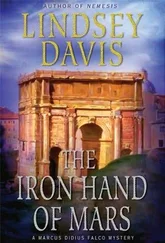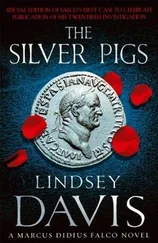Lindsey Davis - The Ides of April
Здесь есть возможность читать онлайн «Lindsey Davis - The Ides of April» весь текст электронной книги совершенно бесплатно (целиком полную версию без сокращений). В некоторых случаях можно слушать аудио, скачать через торрент в формате fb2 и присутствует краткое содержание. Год выпуска: 2013, ISBN: 2013, Издательство: Minotaur Books, Жанр: Исторический детектив, на английском языке. Описание произведения, (предисловие) а так же отзывы посетителей доступны на портале библиотеки ЛибКат.
- Название:The Ides of April
- Автор:
- Издательство:Minotaur Books
- Жанр:
- Год:2013
- ISBN:9781250023698
- Рейтинг книги:3 / 5. Голосов: 1
-
Избранное:Добавить в избранное
- Отзывы:
-
Ваша оценка:
- 60
- 1
- 2
- 3
- 4
- 5
The Ides of April: краткое содержание, описание и аннотация
Предлагаем к чтению аннотацию, описание, краткое содержание или предисловие (зависит от того, что написал сам автор книги «The Ides of April»). Если вы не нашли необходимую информацию о книге — напишите в комментариях, мы постараемся отыскать её.
The Ides of April — читать онлайн бесплатно полную книгу (весь текст) целиком
Ниже представлен текст книги, разбитый по страницам. Система сохранения места последней прочитанной страницы, позволяет с удобством читать онлайн бесплатно книгу «The Ides of April», без необходимости каждый раз заново искать на чём Вы остановились. Поставьте закладку, и сможете в любой момент перейти на страницу, на которой закончили чтение.
Интервал:
Закладка:
Reluctantly, Nepos accepted that no misadventure was indicated. He still wanted to bring in a doctor to look at the body; I persuaded him to keep the money and ask an opinion of a funeral director, who had to be hired anyway. They see enough to give the best assessment of what has happened to a dead person.
The undertaker who came seemed competent. He surveyed the body and refused to excite himself. He did take notice of the mark that I myself had noticed on Salvidia's arm, though like me he thought it was some accidental scrape. He claimed that women were quietly passing away all over Rome for no obvious reason that spring. It might mean some kind of invisible disease was claiming them, but more likely it was just a statistical coincidence. His verdict was that old saying, "There's a lot of it about."
He took the corpse. I promised Nepos I would go to the funeral. It's a good time to claim fees, before the heirs disperse.
I finished up much later in the day than I had expected when I set out earlier to visit the aediles. But that is common in the work I do. Dusk was falling and I needed food, so I went to see my family; they would ply me with supper, in a real home full of warmth, light, comfort and lively conversation. It would improve my mood. I could consult about Salvidia too-not that anyone was able to add any useful thoughts, it turned out. We all agreed I had made the only possible enquiries. If that produced nothing, there must be nothing to find.
VI
When I rolled up back at my own building, it was seriously late. Much of Rome was sleeping. Those awake were sick, making love, committing suicide or burglarising. I would leave them to it.
We had a routine. After dark, moneyed families send home their visiting daughters by carrying chair, with burly slaves and blazing torches. I went along with that. The lurching made me queasy but accepting an escort kept the peace at home. Once the chair reached Fountain Court, we were in my territory and I made the rules. The bearers knew to drop me by the kitchenware potter's. His lock-up shop was diagonally opposite the entrance to my building and he left a flickery taper to show his display. One night the taper would burn down the premises, cindering his lopsided stacks of grape-drainers and grit-bottomed mortars, but in the meantime it gave one faint point of light. I hopped out and stood in silence, listening and making sure that no prowler was likely to jump me.
At the corner, before they left the alley, the bearers always looked back; if I signalled all clear, they would go on their way. If anything in the street felt wrong, I recalled them. I never took chances. This was Rome. Half the people who are mugged at midnight are attacked on their own doorstep.
You may think the bearers could have seen me all the way indoors. Oh yes-and tell every Aventine villain which doorway was mine? A lone female, finely dressed on this occasion, coming back exhausted and a little tipsy … I was ready for bed. I didn't want to have to stick a carving knife in some thief or rapist.
Own up, Albia-. all right, I could have coped with that. I just couldn't face having to sit until dawn in some cold interview room at the vigiles station house, being driven mad by a barely literate bone-head trying to spell "self-defence." Rufinianus, no doubt. The man was straight, but indisputably a halfwit.
Yes, I had once stabbed an intruder and stupidly reported it.
Yes, after lingering a little, he died.
No, I do not regret it.
The Eagle Building, Fountain Court. Everyone still called it the old laundry, though it had not been a wash house for years and nobody knew what had become of the proprietor. Some would have retired on the profits, but it was rumoured ours had drunk them.
I gazed up at the hulking apartment block, half unoccupied as usual these days, though barely a crack of light showed, even from parts that I knew were lived in. Tenants who had work would be up at first light for their back-breaking labours; skivers and the otherwise destitute could not afford lamp oil. Six storeys of ramshackle misery loomed over me, therefore, like a hideous black fortress where prisoners-of-war were being tortured all night. Maybe it was a trick of the darkness, but the whole lump sometimes seemed to lean over the alley as if on the verge of crumpling. It was the kind of building where solitary people died, then their bodies lay undiscovered for weeks. If someone was not seen for a while, we just assumed they were hiding from an estranged spouse or from the authorities. What was one bad smell among so many?
A typically rancid slum landlord had owned this place for many years, until he was bought out by people with consciences. Well-intentioned plans to renovate had come to nothing, defeated by structural failings that were discovered to go right down into the foundations, such as the foundations were. The new owner employed a builder; the builder summoned an architect; the architect brought an engineer; the engineer said stuff it, keep the fee, because even with danger-money he wouldn't touch this place.
So far, the Eagle Building was still there, just about holding itself up. If any tenant had a bad cough, they were asked to go and stay with friends in case reverberation dislodged a crucial structural element.
I lived in the building rent-free. My nostalgia-prone father saw this ghastly building as the home of his carefree youth. My unusual mother humoured him. So it was my crazy family who had bought the lease.
Originally, they had benevolent dreams of filling the apartments with deserving tenants who would be grateful; this crackpot idealism foundered when the first layabouts "forgot" to pay their rent and used the stairs as a lavatory. Now the intention was to demolish the teetering wreck, then sell the empty plot to a millionaire senator, duping him with claims it had potential for a private home. It would happen. An ambitious general from the provinces would be bamboozled by smooth talk of how secluded the Aventine was, a little-known refuge from the city bustle, a historic Roman district where this prime land was ripe for development at a reasonable cost, a rarely available opportunity to build a custom-designed town house…
Don't think we had smoke in our eyes with this plan. We had someone lined up. His name was Trajanus.
Yes, you may have heard of him, and yes, nowadays he does possess a discreet private mansion on the Aventine. My father may look like a barking-mad fantasist, but he comes from a brazen line of hucksters who can sell nuts to people who own their own almond orchards. My grandfather, for example, was a rich auctioneer which- allowing the customary discretion when listing his income for taxation purposes-meant he was as well off as anybody ever needs to be. After he died we all benefited, even me.
Available cash did not help the Eagle Building. Investment would have been wasted on it. A flank wall was shifting and the dirt grew blacker annually. It was no longer safe to use the balcony outside my upstairs office, even though that was the only good feature of the rooms I had there. I ought to move, but lived here because I was used to it. The hideaway at the top had always been an informer's office, so would-be clients had heard of it and could find it. Once they staggered up six flights of stairs, even the ones who thought they were coming to see my father gave in and settled for me.
Hidden away- much lower down, believe me-I had my own apartment, a refuge most people never knew existed. It was where I had lived for the three happy years of my marriage. I stayed there alone afterwards because although life went on, I never thought that fate would favour me a second time. I stopped there with my memories. This was all I had. Happiness had been and gone.
Читать дальшеИнтервал:
Закладка:
Похожие книги на «The Ides of April»
Представляем Вашему вниманию похожие книги на «The Ides of April» списком для выбора. Мы отобрали схожую по названию и смыслу литературу в надежде предоставить читателям больше вариантов отыскать новые, интересные, ещё непрочитанные произведения.
Обсуждение, отзывы о книге «The Ides of April» и просто собственные мнения читателей. Оставьте ваши комментарии, напишите, что Вы думаете о произведении, его смысле или главных героях. Укажите что конкретно понравилось, а что нет, и почему Вы так считаете.












